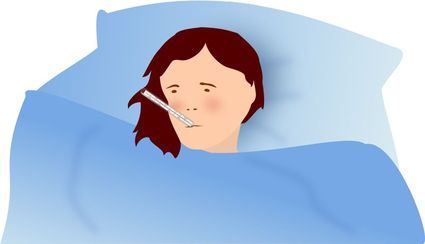'The Best Prevention for Influenza is the Flu Vaccine'
Last updated 10/27/2016 at 6:46pm | View PDF
Flu season is here. It's time to take steps to protect yourself against "Influenza 2016."
The influenza strains that are expected to be most prevalent this year are the A/California, A/Hong Kong, B/Brisbane and B/Phuket.
"These are the strains selected for this season's vaccines," said Tulare County Health Officer Dr. Karen Haught, who offered her advice for staying healthy during the coming flu season.
"The best prevention for influenza is the flu vaccine," she said. "Everyone over the age of six months should receive the flu vaccine. Now is the time to obtain a flu vaccine as it takes approximately two weeks for protection to develop after receiving a vaccine."
Only injectable flu vaccines are recommended this year, according to Dr. Haught. "The live attenuated vaccine that was given as a nasal spray vaccine is not recommended this year because of questions about its effectiveness."
She offered other advice, including staying away from those who are sick. "If you are sick avoid contact with others until at least 24 hours after fever is resolved," she said.
She also advises people to:
• Wash your hands frequently and use alcohol-based hand gel when soap and water are not available.
• Cover your nose and mouth with a tissue when you sneeze or cough, and throw the tissue in trash and wash your hands (when a tissue is not available turn your head onto toward upper arm).
• Avoid touching your eyes, nose and mouth.
• Disinfect surfaces that may have germs.
If you or someone you take care of gets influenza, Dr. Haught makes the following suggestions:
• Speak to your healthcare provider about whether antiviral medications are needed. Antiviral medications can shorten the illness if started early and they are particularly important for individuals with chronic conditions or who have severe illness.
• Encourage rest and adequate fluids.
• If there are warning signs of serious illness, seek immediate medical care. Such signs include: fast breathing or shortness of breath, bluish color, fever with a rash, not eating or drinking, flu symptoms that improve then return, worsening cough or decreased alertness.
A flu vaccine is available at doctor's offices and clinics, pharmacies, through some employers and through the Public Health Department. All these venues provide safe and effective vaccines. Several injectable options are available and all are considered safe and effective.
The types of vaccines available include:
• Standard dose of trivalent vaccine (provides protection from both Influenza A viruses and the B/Brisbane virus)
• High dose trivalent vaccine for people 65 and over
• Trivalent vaccine with adjuvant to increase immune response for people 65 and over
• Recombinant trivalent vaccine which is egg-free for people 18 years of age and older
• Quadrivalent vaccine which includes the three strains in the trivalent plus the B/Phukat strain
• Quadrivalent vaccine made in cell culture approved for those age 4 and over
• Intradermal quadrivalent vaccine
The influenza vaccine needs to be given every year. It is particularly important for pregnant women, anyone with a chronic health condition, those over 65, residents of long-term care facilities, people with extreme obesity and individuals who care for someone with a high risk condition, including all healthcare workers.




Reader Comments(0)